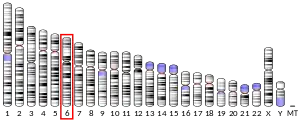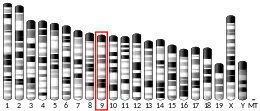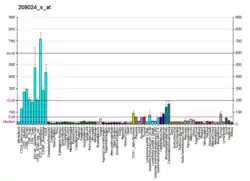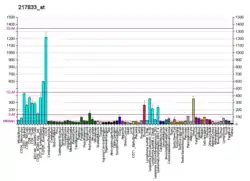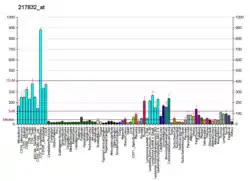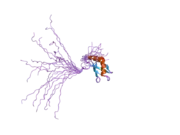SYNCRIP
Synaptotagmin-binding, cytoplasmic RNA-interacting protein (SYNCRIP), also known as heterogeneous nuclear ribonucleoprotein (hnRNP) Q or NS1-associated protein-1 (NSAP-1), is a protein that in humans is encoded by the SYNCRIP gene.[5][6][7] As the name implies, SYNCRIP is localized predominantly in the cytoplasm.[8] It is evolutionarily conserved across eukaryotes and participates in several cellular and disease pathways, especially in neuronal and muscular development.[9] In humans, there are three isoforms, all of which are associated in vitro with pre-mRNAs, mRNA splicing intermediates, and mature mRNA-protein complexes, including mRNA turnover.[10]
| SYNCRIP | |||||||||||||||||||||||||||||||||||||||||||||||||||
|---|---|---|---|---|---|---|---|---|---|---|---|---|---|---|---|---|---|---|---|---|---|---|---|---|---|---|---|---|---|---|---|---|---|---|---|---|---|---|---|---|---|---|---|---|---|---|---|---|---|---|---|
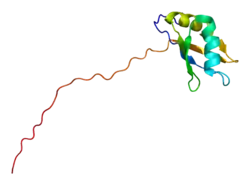 | |||||||||||||||||||||||||||||||||||||||||||||||||||
| |||||||||||||||||||||||||||||||||||||||||||||||||||
| Identifiers | |||||||||||||||||||||||||||||||||||||||||||||||||||
| Aliases | SYNCRIP, GRY-RBP, GRYRBP, HNRNPQ, HNRPQ1, NSAP1, PP68, hnRNP-Q, synaptotagmin binding cytoplasmic RNA interacting protein | ||||||||||||||||||||||||||||||||||||||||||||||||||
| External IDs | OMIM: 616686 MGI: 1891690 HomoloGene: 4648 GeneCards: SYNCRIP | ||||||||||||||||||||||||||||||||||||||||||||||||||
| |||||||||||||||||||||||||||||||||||||||||||||||||||
| |||||||||||||||||||||||||||||||||||||||||||||||||||
| |||||||||||||||||||||||||||||||||||||||||||||||||||
| |||||||||||||||||||||||||||||||||||||||||||||||||||
| |||||||||||||||||||||||||||||||||||||||||||||||||||
| Wikidata | |||||||||||||||||||||||||||||||||||||||||||||||||||
| |||||||||||||||||||||||||||||||||||||||||||||||||||
Structure and function
This gene belongs to the subfamily of ubiquitously expressed heterogeneous nuclear ribonucleoproteins (hnRNPs). The hnRNPs are RNA-binding proteins and they complex with heterogeneous nuclear RNA (hnRNA).
SYNCRIP is made up of an N-terminal helix bundle known as the “acidic domain” (AcD), followed by three sequential RNA recognition motifs (RRMs) separated by short linkers, and an arginine-glycine-rich domain called the “RGG box” at the C-terminus. The RRMs play a role in RNA binding, while the AcD engages in protein-protein interactions (PPIs). The RGG box is involved in both RNA binding and in PPIs. The AcD is unique to SYNCRIP and its nuclear homolog hnRNP R, and is involved in interactions with APOBEC-1.[11] It is a self-folding, all-helical domain of five α-helices, containing a large hydrophobic cavity and a positively charged surface area as potential interaction sites in addition to negatively charged surface areas, with no structural homologs in any other known proteins.[11][12] The hydrophobic core is mostly made up of leucine residues, while the surface is made up of 15 acidic residues and 13 basic residues which together form a vast interaction network.[12] The AcD is linked to RRM1 by a unique α-β-β unit, creating an “extended RRM fold” mediated primarily by hydrophobic interactions.[12] The RGG box is an unstructured region containing numerous Arg-Gly-Gly repeats with fairly regular spacing. There are eight such repeats in SYNCRIP. This domain can bind proteins and RNA independently, even if the other binding domains are not present.[13] Although this domain is rich in arginine content, it does not have any arginine-rich clusters as might be observed in usual arginine-rich RBPs.[13]
Isoform 1 is a component of the apolipoprotein B (apoB) mRNA editosome complex, and it modulates the post-transcriptional C-to-U RNA editing of apoB mRNA through binding either to the apoB mRNA-editing enzyme catalytic peptide 1 (APOBEC-1), to the APOBEC-1 complementation factor (ACF), or directly to RNA itself.[6] Isoform 1 is also implicated with other RBPs in the cytoplasmic de-adenylation and translational and decay interplay of c-Fos mRNA mediated by the major coding-region determinant of instability (mCRD) domain.[14]
The function of isoform 2 is not as clearly understood.
Isoform 3 is involved in cytoplasmic vesicle-based mRNA transport through interaction with synaptotagmins (SYTs).[8] This isoform is also a component of the gamma interferon (IFNγ)-activated inhibitor of translation (GAIT) complex in humans, which mediates IFNγ-induced transcript-selective translation inhibition in inflammation processes.[15] Upon IFN-γ activation, SYNCRIP assembles into the GAIT complex, which binds to stem-loop-containing GAIT elements in the 3’-untranslated region (3’- UTR) of diverse inflammatory mRNAs and suppresses their translation, but this seems to not be essential for the overall function of the GAIT complex.[15]
References
- GRCh38: Ensembl release 89: ENSG00000135316 - Ensembl, May 2017
- GRCm38: Ensembl release 89: ENSMUSG00000032423 - Ensembl, May 2017
- "Human PubMed Reference:". National Center for Biotechnology Information, U.S. National Library of Medicine.
- "Mouse PubMed Reference:". National Center for Biotechnology Information, U.S. National Library of Medicine.
- Harris CE, Boden RA, Astell CR (January 1999). "A novel heterogeneous nuclear ribonucleoprotein-like protein interacts with NS1 of the minute virus of mice". Journal of Virology. 73 (1): 72–80. doi:10.1128/JVI.73.1.72-80.1999. PMC 103810. PMID 9847309.
- Lau PP, Chang BH, Chan L (April 2001). "Two-hybrid cloning identifies an RNA-binding protein, GRY-RBP, as a component of apobec-1 editosome". Biochemical and Biophysical Research Communications. 282 (4): 977–83. doi:10.1006/bbrc.2001.4679. PMID 11352648.
- "Entrez Gene: SYNCRIP synaptotagmin binding, cytoplasmic RNA interacting protein".
- Mizutani A, Fukuda M, Ibata K, Shiraishi Y, Mikoshiba K (March 2000). "SYNCRIP, a cytoplasmic counterpart of heterogeneous nuclear ribonucleoprotein R, interacts with ubiquitous synaptotagmin isoforms". The Journal of Biological Chemistry. 275 (13): 9823–31. doi:10.1074/jbc.275.13.9823. PMID 10734137.
- Chen Y, Chan J, Chen W, Li J, Sun M, Kannan GS, Mok YK, Yuan YA, Jobichen C (March 2020). "SYNCRIP, a new player in pri-let-7a processing". RNA. 26 (3): 290–305. doi:10.1261/rna.072959.119. PMC 7025501. PMID 31907208.
- Mourelatos Z, Abel L, Yong J, Kataoka N, Dreyfuss G (October 2001). "SMN interacts with a novel family of hnRNP and spliceosomal proteins". The EMBO Journal. 20 (19): 5443–52. doi:10.1093/emboj/20.19.5443. PMC 125643. PMID 11574476.
- Beuck C, Williamson JR, Wüthrich K, Serrano P (August 2016). "The acidic domain is a unique structural feature of the splicing factor SYNCRIP". Protein Science. 25 (8): 1545–50. doi:10.1002/pro.2935. PMC 4972210. PMID 27081926.
- Hobor F, Dallmann A, Ball NJ, Cicchini C, Battistelli C, Ogrodowicz RW, Christodoulou E, Martin SR, Castello A, Tripodi M, Taylor IA, Ramos A (February 2018). "A cryptic RNA-binding domain mediates Syncrip recognition and exosomal partitioning of miRNA targets". Nature Communications. 9 (1): 831. Bibcode:2018NatCo...9..831H. doi:10.1038/s41467-018-03182-3. PMC 5827114. PMID 29483512.
- Kiledjian M, Dreyfuss G (1992). "Primary structure and binding activity of the hnRNP U protein: Binding RNA through RGG box". EMBO Journal. 11 (7): 2655–64. doi:10.1002/j.1460-2075.1992.tb05331.x. ISSN 0261-4189. PMC 556741. PMID 1628625.
- Grosset C, Chen CY, Xu N, Sonenberg N, Jacquemin-Sablon H, Shyu AB (September 2000). "A mechanism for translationally coupled mRNA turnover: interaction between the poly(A) tail and a c-fos RNA coding determinant via a protein complex". Cell. 103 (1): 29–40. doi:10.1016/S0092-8674(00)00102-1. PMID 11051545. S2CID 18135412.
- Arif A, Chatterjee P, Moodt RA, Fox PL (October 2012). "Heterotrimeric GAIT Complex Drives Transcript-Selective Translation Inhibition in Murine Macrophages". Molecular and Cellular Biology. 32 (24): 5046–55. doi:10.1128/mcb.01168-12. PMC 3510535. PMID 23071094.
- Blanc V, Navaratnam N, Henderson JO, Anant S, Kennedy S, Jarmuz A, Scott J, Davidson NO (March 2001). "Identification of GRY-RBP as an apolipoprotein B RNA-binding protein that interacts with both apobec-1 and apobec-1 complementation factor to modulate C to U editing". The Journal of Biological Chemistry. 276 (13): 10272–83. doi:10.1074/jbc.M006435200. PMID 11134005.
Further reading
- Maruyama K, Sugano S (January 1994). "Oligo-capping: a simple method to replace the cap structure of eukaryotic mRNAs with oligoribonucleotides". Gene. 138 (1–2): 171–74. doi:10.1016/0378-1119(94)90802-8. PMID 8125298.
- Fu C, Chan AC (October 1997). "Identification of two tyrosine phosphoproteins, pp70 and pp68, which interact with phospholipase Cgamma, Grb2, and Vav after B cell antigen receptor activation". The Journal of Biological Chemistry. 272 (43): 27362–8. doi:10.1074/jbc.272.43.27362. PMID 9341187.
- Suzuki Y, Yoshitomo-Nakagawa K, Maruyama K, Suyama A, Sugano S (October 1997). "Construction and characterization of a full length-enriched and a 5'-end-enriched cDNA library". Gene. 200 (1–2): 149–56. doi:10.1016/S0378-1119(97)00411-3. PMID 9373149.
- Neubauer G, King A, Rappsilber J, Calvio C, Watson M, Ajuh P, Sleeman J, Lamond A, Mann M (September 1998). "Mass spectrometry and EST-database searching allows characterization of the multi-protein spliceosome complex". Nature Genetics. 20 (1): 46–50. doi:10.1038/1700. PMID 9731529. S2CID 585778.
- Rossoll W, Kröning AK, Ohndorf UM, Steegborn C, Jablonka S, Sendtner M (January 2002). "Specific interaction of Smn, the spinal muscular atrophy determining gene product, with hnRNP-R and gry-rbp/hnRNP-Q: a role for Smn in RNA processing in motor axons?". Human Molecular Genetics. 11 (1): 93–105. doi:10.1093/hmg/11.1.93. PMID 11773003.
- Jurica MS, Licklider LJ, Gygi SR, Grigorieff N, Moore MJ (April 2002). "Purification and characterization of native spliceosomes suitable for three-dimensional structural analysis". RNA. 8 (4): 426–39. doi:10.1017/S1355838202021088. PMC 1370266. PMID 11991638.
- Hresko RC, Mueckler M (July 2002). "Identification of pp68 as the Tyrosine-phosphorylated Form of SYNCRIP/NSAP1. A cytoplasmic RNA-binding protein". The Journal of Biological Chemistry. 277 (28): 25233–8. doi:10.1074/jbc.M202556200. PMID 11994298.
- Carty SM, Greenleaf AL (August 2002). "Hyperphosphorylated C-terminal repeat domain-associating proteins in the nuclear proteome link transcription to DNA/chromatin modification and RNA processing". Molecular & Cellular Proteomics. 1 (8): 598–610. doi:10.1074/mcp.M200029-MCP200. PMID 12376575.
- Angenstein F, Evans AM, Settlage RE, Moran ST, Ling SC, Klintsova AY, Shabanowitz J, Hunt DF, Greenough WT (October 2002). "A receptor for activated C kinase is part of messenger ribonucleoprotein complexes associated with polyA-mRNAs in neurons". The Journal of Neuroscience. 22 (20): 8827–37. doi:10.1523/JNEUROSCI.22-20-08827.2002. PMC 6757688. PMID 12388589.
- Hinsby AM, Olsen JV, Bennett KL, Mann M (January 2003). "Signaling initiated by overexpression of the fibroblast growth factor receptor-1 investigated by mass spectrometry". Molecular & Cellular Proteomics. 2 (1): 29–36. CiteSeerX 10.1.1.580.5376. doi:10.1074/mcp.M200075-MCP200. PMID 12601080. S2CID 40711397.
- Moraes KC, Quaresma AJ, Maehnss K, Kobarg J (January 2003). "Identification and characterization of proteins that selectively interact with isoforms of the mRNA binding protein AUF1 (hnRNP D)". Biological Chemistry. 384 (1): 25–37. doi:10.1515/BC.2003.004. PMID 12674497. S2CID 30993043.
- Moraes KC, Quaresma AJ, Maehnss K, Kobarg J (January 2003). "Identification and characterization of proteins that selectively interact with isoforms of the mRNA binding protein AUF1 (hnRNP D)". Biological Chemistry. 384 (1): 25–37. doi:10.1515/BC.2003.004. ISSN 1431-6730. PMID 12674497. S2CID 30993043.
- Kim JH, Paek KY, Ha SH, Cho S, Choi K, Kim CS, Ryu SH, Jang SK (September 2004). "A cellular RNA-binding protein enhances internal ribosomal entry site-dependent translation through an interaction downstream of the hepatitis C virus polyprotein initiation codon". Molecular and Cellular Biology. 24 (18): 7878–90. doi:10.1128/MCB.24.18.7878-7890.2004. PMC 515056. PMID 15340051.
- Quaresma AJ, Bressan GC, Gava LM, Lanza DC, Ramos CH, Kobarg J (April 2009). "Human hnRNP Q re-localizes to cytoplasmic granules upon PMA, thapsigargin, arsenite and heat-shock treatments". Experimental Cell Research. 315 (6): 968–80. doi:10.1016/j.yexcr.2009.01.012. PMID 19331829.
- Vincendeau M, Nagel D, Brenke JK, Brack-Werner R, Hadian K (2013). "Heterogenous nuclear ribonucleoprotein Q increases protein expression from HIV-1 Rev-dependent transcripts". Virology Journal. 10 (151): 151. doi:10.1186/1743-422X-10-151. PMC 3673855. PMID 23679954.
- Santangelo L, Giurato G, Cicchini C, Montaldo C, Mancone C, Tarallo R, Battistelli C, Alonzi T, Weisz A, Tripodi M (October 2016). "The RNA-Binding Protein SYNCRIP Is a Component of the Hepatocyte Exosomal Machinery Controlling MicroRNA Sorting". Cell Reports. 17 (3): 799–808. doi:10.1016/j.celrep.2016.09.031. ISSN 2211-1247. PMID 27732855.
- Cappelli S, Romano M, Buratti E (August 2018). "Systematic Analysis of Gene Expression Profiles Controlled by hnRNP Q and hnRNP R, Two Closely Related Human RNA Binding Proteins Implicated in mRNA Processing Mechanisms". Frontiers in Molecular Biosciences. 5 (79): 79. doi:10.3389/fmolb.2018.00079. ISSN 2296-889X. PMC 6125337. PMID 30214903.
